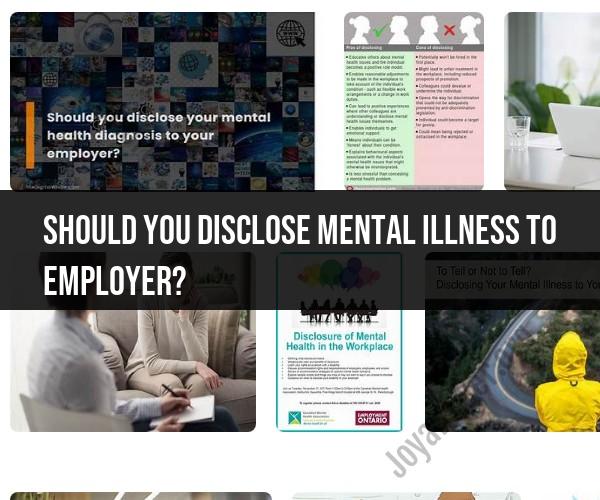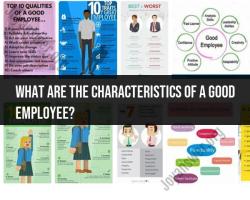Should you disclose mental illness to employer?
Deciding whether to disclose a mental illness to your employer is a personal and complex decision that should be made carefully. There are pros and cons to consider, and the best course of action may vary depending on your specific situation. Here are some important considerations and strategies to help you make an informed decision:
Considerations:
Legal Protections: In many countries, including the United States, there are legal protections in place to prevent discrimination based on mental health conditions. For example, the Americans with Disabilities Act (ADA) prohibits employment discrimination against individuals with disabilities, including mental health conditions.
Company Policies: Review your company's policies and employee handbook. Some employers have policies in place to support employees with mental health conditions, including reasonable accommodations.
Workplace Culture: Assess your workplace culture and the attitudes of your colleagues and supervisors towards mental health. An open and supportive work environment may make disclosure more comfortable.
Impact on Job Performance: Consider whether your mental health condition is affecting your job performance. If it is, disclosing it may allow your employer to provide necessary support and accommodations.
Accommodations: If you believe that disclosing your condition could lead to accommodations that would help you perform your job effectively, it might be a valid reason to consider disclosure.
Strategies:
Understand Your Rights: Familiarize yourself with the laws and regulations protecting employees with mental health conditions in your country and region.
Consult HR or a Supervisor: If you're considering disclosure, reach out to your human resources department or a trusted supervisor to discuss your options and inquire about available resources and support.
Plan Ahead: If you decide to disclose, plan ahead and be prepared to discuss how your mental health condition impacts your work and what accommodations, if any, you may need.
Focus on Abilities: Emphasize your abilities and contributions to the organization. Frame the conversation in a way that highlights how you can continue to be a valuable employee with or without accommodations.
Private vs. Public Disclosure: You can choose to disclose to HR or a supervisor privately, rather than making it public to all colleagues. This allows you to maintain a degree of privacy.
Request Reasonable Accommodations: If your mental health condition requires accommodations, make a formal request for reasonable accommodations. These might include flexible work hours, adjusted workload, or time off for medical appointments or therapy.
Document Everything: Keep records of all interactions related to your disclosure and accommodation requests. This documentation can be helpful if issues arise later.
Seek Support: Reach out to mental health professionals, support groups, or employee assistance programs for guidance on how to navigate disclosure and manage your condition at work.
Ultimately, the decision to disclose your mental illness to your employer is a highly personal one. It's important to weigh the potential benefits, such as receiving support and accommodations, against any concerns you may have about stigma or discrimination. Before making a decision, take the time to carefully assess your individual circumstances, consult trusted advisors, and make a choice that is in your best interest and well-being.
Disclosing Mental Illness to Your Employer: Considerations and Guidance
The decision of whether or not to disclose mental illness to your employer is a personal one. There are many factors to consider, such as the nature of your mental illness, the type of work you do, and the culture of your workplace.
If you are considering disclosing your mental illness to your employer, it is important to weigh the pros and cons carefully. On the one hand, disclosing your mental illness can help you to get the support you need at work and to create a more understanding and supportive work environment. On the other hand, there is always the risk of stigma and discrimination.
Here are some considerations to keep in mind when deciding whether or not to disclose your mental illness to your employer:
- What is the nature of your mental illness? If your mental illness is severe or if it significantly impacts your ability to do your job, then disclosing your mental illness to your employer may be necessary.
- What type of work do you do? If your job is stressful or demanding, then disclosing your mental illness to your employer may be helpful.
- What is the culture of your workplace? If your workplace is supportive and inclusive, then you may be more likely to have a positive experience if you disclose your mental illness.
The Decision to Share Mental Health Challenges at Work
There are many reasons why you might choose to share your mental health challenges at work. For example, you may need to request accommodations, such as a flexible schedule or the ability to work from home. You may also want to share your story in order to raise awareness about mental health and to reduce stigma.
Whatever your reason, it is important to be prepared when you disclose your mental illness to your employer. Here are some tips:
- Have a clear plan. What do you want to communicate to your employer? What accommodations are you requesting?
- Be prepared to answer questions. Your employer may have questions about your mental illness and how it impacts your work. Be prepared to answer these questions honestly and openly.
- Be confident. You have the right to disclose your mental illness to your employer. Remember that you are not alone and that there are many resources available to support you.
Legal Protections and Employer Responsibilities
In the United States, the Americans with Disabilities Act (ADA) protects employees with disabilities from discrimination. This means that your employer cannot discriminate against you because of your mental illness.
Your employer also has a responsibility to provide reasonable accommodations to employees with disabilities. Reasonable accommodations are changes to the workplace or job that allow you to perform your job duties. Some examples of reasonable accommodations for mental health conditions include:
- Flexible work hours
- Ability to work from home
- Modified work schedule
- Reduced workload
- Stress management training
If you need an accommodation, you should request one from your employer in writing. Your employer should then engage in a good faith dialogue with you to determine what accommodation is reasonable and effective.
Creating a Supportive Work Environment for Mental Health
There are a number of things that employers can do to create a more supportive work environment for mental health. For example, employers can:
- Provide training on mental health for all employees.
- Promote a culture of open communication and support.
- Offer employee assistance programs (EAPs) and other mental health resources.
- Create a flexible and supportive work environment.
Stories and Advice from Individuals Who've Disclosed Mental Illness
Here are some stories and advice from individuals who've disclosed their mental illness to their employer:
- "I was nervous about disclosing my mental illness to my employer, but I'm so glad I did. My employer was very supportive and understanding. They were able to provide me with some accommodations that made a big difference in my ability to do my job. I'm so grateful for their support."
- "I disclosed my mental illness to my employer because I needed to request a flexible schedule. My employer was very understanding and accommodating. They were able to give me the flexible schedule I needed. I'm so glad that I was able to be open and honest with my employer about my mental illness."
- "I disclosed my mental illness to my employer because I wanted to raise awareness about mental health and to reduce stigma. My employer was very supportive of my decision. They allowed me to share my story with other employees. I'm so glad that I was able to make a difference in the workplace."
If you are considering disclosing your mental illness to your employer, please know that you are not alone. There are many resources available to support you













